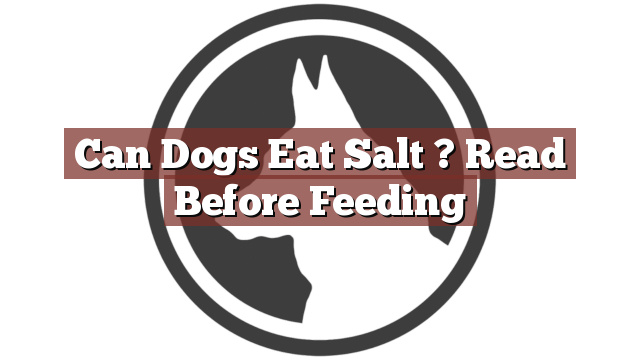Understanding Your Dog’s Dietary Needs
As responsible pet owners, it is crucial for us to understand our furry friends’ dietary needs. Just like humans, dogs require a balanced and nutritious diet to maintain optimal health. While it may be tempting to share our favorite foods with our canine companions, it is essential to remember that not all human foods are safe for dogs. One such food item that raises questions is salt. So, can dogs eat salt? Let’s find out.
Can Dogs Eat Salt? Read Before Feeding
Can dogs eat salt? The answer is both yes and no. While small amounts of salt may not pose an immediate threat to dogs, excessive consumption can be harmful. Salt contains sodium, and dogs require a minimal amount of sodium for their bodily functions. However, their bodies are not designed to handle excessive amounts of salt.
When dogs consume too much salt, it can lead to sodium ion poisoning, which can be life-threatening. Symptoms of sodium ion poisoning in dogs include excessive thirst, increased urination, vomiting, diarrhea, tremors, seizures, and even death in severe cases. Therefore, it is crucial to be cautious when it comes to feeding salt to your furry friend.
Pros and Cons of Feeding Salt to Your Dog
While sodium is vital for maintaining a proper electrolyte balance in a dog’s body, excessive salt intake can lead to various health problems. Some potential risks associated with feeding salt to your dog include:
- Dehydration: Excess sodium can cause water retention in a dog’s body, leading to dehydration if not properly regulated.
- Kidney and Heart Issues: High sodium levels can put stress on a dog’s kidneys and heart, potentially leading to long-term health problems.
- Increased Blood Pressure: Similar to humans, excessive salt intake can raise a dog’s blood pressure, increasing the risk of cardiovascular issues.
- Toxicity: Certain types of salt, such as rock salt or table salt with added chemicals, can be toxic to dogs even in small amounts.
Considering the potential risks, it is best to avoid feeding salt to your dog unless specifically recommended by a veterinarian. A balanced dog food should provide the necessary sodium levels required for their well-being.
Conclusion: Considerations for Your Dog’s Salt Intake
In conclusion, while small amounts of salt may not be harmful to dogs, it is important to exercise caution when considering feeding salt to your furry friend. Can a dog eat salt? Yes, but only in moderation and under the guidance of a veterinarian. Excessive salt intake can lead to serious health problems, so it is crucial to be mindful of your dog’s sodium consumption. If you suspect your dog has consumed too much salt or is showing symptoms of sodium ion poisoning, it is crucial to seek immediate veterinary care. Remember, a well-balanced dog food should provide the necessary nutrients to keep your beloved pet healthy and happy.
Thank you for taking the time to read through our exploration of [page_title]. As every dog lover knows, our furry friends have unique dietary needs and responses, often varying from one canine to another. This is why it's paramount to approach any changes in their diet with caution and knowledge.
Before introducing any new treats or making alterations to your dog's diet based on our insights, it's crucial to consult with a veterinarian about [page_title]. Their expertise ensures that the choices you make are well-suited to your particular pet's health and well-being.
Even seemingly harmless foods can sometimes lead to allergic reactions or digestive issues, which is why monitoring your dog after introducing any new food item is essential.
The content provided here on [page_title] is crafted with care, thorough research, and a genuine love for dogs. Nevertheless, it serves as a general guideline and should not be considered a substitute for professional veterinary advice.
Always prioritize the expert insights of your veterinarian, and remember that the health and happiness of your furry companion come first.
May your journey with your pet continue to be filled with joy, love, and safe culinary adventures. Happy reading, and even happier snacking for your canine friend!

